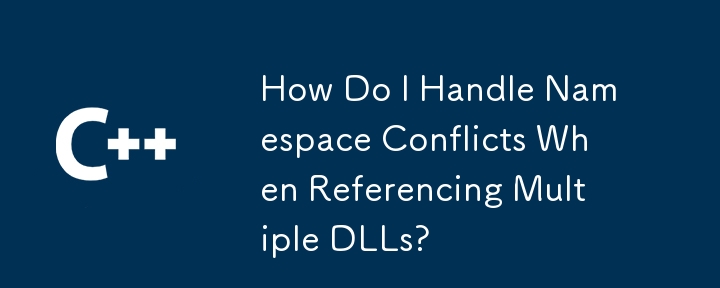Home >Backend Development >C++ >How Do I Handle Namespace Conflicts When Referencing Multiple DLLs?
How Do I Handle Namespace Conflicts When Referencing Multiple DLLs?
- Susan SarandonOriginal
- 2024-12-29 22:19:21406browse

Resolving Namespace Conflicts in Multiple DLLs
When faced with the challenge of referencing multiple DLLs with the same namespace, it's important to understand the nature of namespaces and how they operate in different assemblies.
As indicated in the response, namespaces provide a means to group related types, adding a common prefix to each type name. This allows for multiple types with the same name to exist under different namespaces, creating a logical separation between them.
When referencing multiple DLLs with overlapping namespaces, there's no need for special handling. The compiler resolves the fully qualified name of each type, considering the namespace and assembly where it resides.
In the unlikely situation where DLLs share both the same namespaces and type names, aliases can be utilized to disambiguate between assemblies. When referencing the DLL, specify a unique alias, and within the source code, use the alias followed by the namespace and type name to access the desired type.
For example, if two DLLs have a type named MyType under a shared namespace MyNamespace, an alias can be used to differentiate them as follows:
using global::MyNamespace.MyType; // Reference type from default alias using MyCustomAlias::MyNamespace.MyType; // Reference type from custom alias
In conclusion, referencing multiple DLLs with the same namespace does not pose a significant issue. Namespaces ensure a clear distinction between types, and aliases can be employed in rare cases where there are naming collisions across assemblies. This allows for the efficient use of methods and types from various sources within a single project.
The above is the detailed content of How Do I Handle Namespace Conflicts When Referencing Multiple DLLs?. For more information, please follow other related articles on the PHP Chinese website!
Related articles
See more- C++ compilation error: A header file is referenced multiple times, how to solve it?
- C++ compilation error: wrong function parameters, how to fix it?
- C++ error: The constructor must be declared in the public area, how to deal with it?
- Process management and thread synchronization in C++
- How to deal with data splitting problems in C++ development

